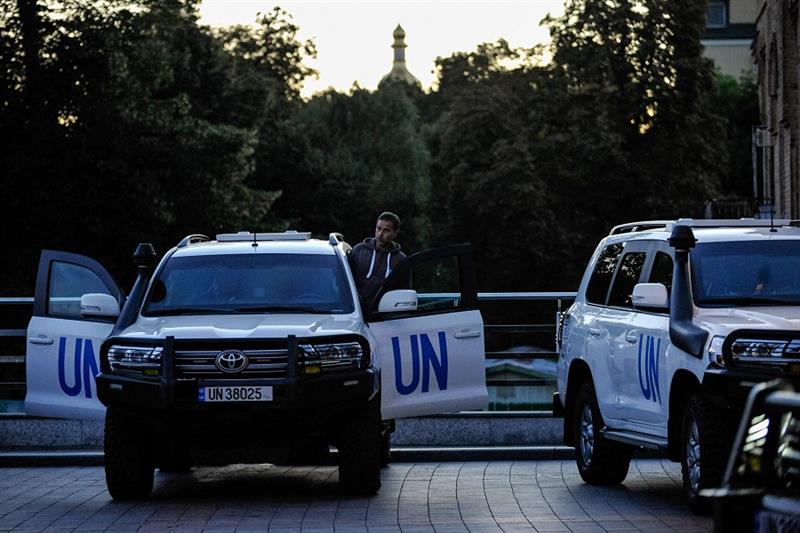
UN vehicles transporting an International Atomic Energy Agency (IAEA) inspection team leave Kyiv on August 31, 2022. AFP
A convoy brought in the 14-strong team, led by the head of the International Atomic Energy Agency (IAEA), which had left Kyiv in the morning.
The fate of the Zaporizhzhia nuclear plant which is located on the frontline between Russian and Ukrainian forces has stoked global concern.
The area has been shelled repeatedly in recent days, with Ukraine on Wednesday accusing Russian forces of hitting Energodar, a town with a pre-war population of some 50,000 people which is next to the plant.
Both sides have repeatedly traded blame over attacks in the area.
"The Russian army is shelling Energodar," said Evhen Yevtushenko, head of Nikopol district military administration which is located on the northern bank of the Dnipro River opposite the town and its plant.
"These provocations are dangerous," he wrote on Telegram.
One of the shells hit Energodar's city council, Mayor Dmytro Orlov wrote on Telegram, posting pictures of the damaged building with a hole punched into the side and debris littering the ground.
News of the strike came after the IAEA team left Kyiv for the southern city of Zaporizhzhia.
Although the city is normally about a two-hour drive from the plant, it was far from clear how or when the IAEA team would reach the site given the complexities of crossing into Russian-held areas.
"We are now finally moving," IAEA chief Rafael Grossi told reporters before heading off with his 13-strong team.
He said they planned to spend "a few days" at the plant and would report back afterwards.
The plant has been occupied by Russian troops since March and Ukraine has accused Russia of deploying hundreds of soldiers and storing ammunition there.
Kyiv has insisted the team access the plant via Ukrainian-held territory, meaning the inspectors will have to cross the front line with security guarantees from both sides.
"Sadly, Russia is not stopping its provocations precisely in the direction the mission needs to travel to reach the plant," President Volodymyr Zelensky said late Tuesday after meeting Grossi.
The situation was "extremely menacing", he said, accusing the Russians of "continuing bombardments" and calling for "an immediate and total demilitarisation" of the Zaporizhzhia nuclear plant.
In Moscow, the Russian defence ministry accused Kyiv of "continued provocations aimed at disrupting the work of the IAEA mission" saying it had shelled the area around the plant on Tuesday hitting a building containing "the solid radioactive waste processing complex".
Meanwhile, intensive fighting raged across the nearby southern region of Kherson where Ukraine began a counteroffensive on Monday.
Most of the region and its provincial capital of the same name were seized by Russian forces at the start of the invasion six months ago.
With the war in the eastern Donbas region largely stalled, analysts have said for weeks that combat is likely to shift south to break the stalemate before winter comes.
In its morning update, the president's office in Kyiv said "fighting continued throughout the night" in Kherson, and that one person had been killed and two injured in an overnight bombing in the Mykolaiv area.
But the Russian defence ministry said Kyiv's attempts to advance its counteroffensive had "failed" with Ukrainian forces suffering "significant losses and were driven back by Russian troops".
For its part, the Ukrainian presidency claimed its forces had destroyed "almost all large bridges" over the Dnipro River, a key supply route for Russian forces, leaving only pedestrian crossings in place.
Meanwhile, Russian energy giant Gazprom suspended gas deliveries to Germany for maintenance on a major pipeline Wednesday, in the latest in a series of supply halts that have fuelled an energy crisis in Europe.
The move comes as European countries have faced soaring energy prices since Russia invaded Ukraine in late February and subsequently curbed its gas deliveries to the region.
And in Prague, which holds the rotating European Union presidency, EU foreign ministers are meeting to discuss travel restrictions on Russia over its Ukraine invasion.
Short link: